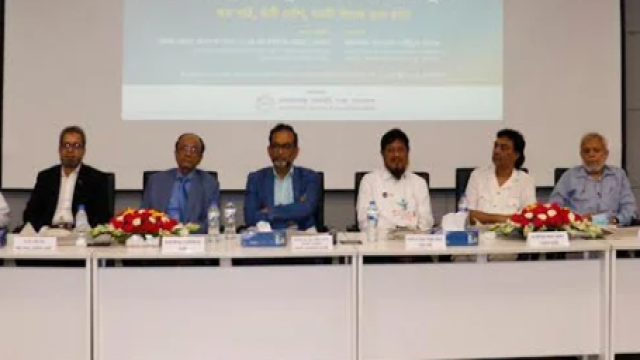DHAKA, June 19 (V7N) – A recent study has uncovered an alarming prevalence of fatty liver disease in Bangladesh, with one in every three adults affected. The condition is primarily attributed to high consumption of carbohydrates and increasingly sedentary lifestyles.
The study, highlighted at an awareness seminar titled "Eat light, walk right — keep fatty liver out of sight," revealed that individuals who frequently dine out, remain seated for over five hours a day, and engage in minimal physical activity are at the greatest risk. The seminar was organized by Bangladesh Medical University (BMU) as part of the 8th Global Fatty Liver Day observance on June 12, under the global theme "Act Now, Screen Today."
Distinguished physicians, nutritionists, and scientists at the seminar warned that fatty liver has become a pressing global public health issue, now surpassing viral infections as the leading cause of chronic liver inflammation. They cited the study, which estimates that approximately 45 million people in Bangladesh are suffering from fatty liver, with about 10 million among them facing the risk of developing severe complications such such as liver cirrhosis or liver cancer.
However, experts emphasized that in most cases, fatty liver and non-alcoholic steatohepatitis (NASH) can be prevented or even reversed through simple lifestyle modifications, including changes in dietary habits, incorporating regular walking, and achieving healthy weight loss. They also underscored the importance of obligating food producers to create more health-friendly products.
The seminar, chaired by BMU Vice Chancellor and President of Hepatology Society Professor Dr. Md. Shahinul Alam, featured former caretaker government's health adviser Major General Professor (Dr) ASM Matiur Rahman (Retd) as chief guest, and Dr. Md. Golam Azam, liver specialist at BIRDEM Hospital, as the main speaker.
Professor (Dr) ASM Matiur Rahman stressed the necessity of a collaborative, multi-sectoral, and multidisciplinary approach to tackle fatty liver disease. He highlighted that effective prevention must start at the national policy-making levels and extend to community engagement through targeted programs, with public awareness campaigns beginning from early childhood for long-term impact.
Professor Shahinul Alam reiterated that preventing fatty liver is the most effective form of treatment, noting that the disease can be detected through a single diagnostic test. He stressed the importance of patient-centered, scientific care tailored to the specific type of fatty liver. To effectively combat the disease, he urged a coordinated effort among various ministries and institutions, including the Ministry of Health, Ministry of Religion, Ministry of Education, and Local Government Engineering Department (LGED).
Participants outlined a national action plan, recommending that individuals walk at least 30 minutes, five days a week, and incorporate exercises like jumping rope and cycling. They also advised reducing calorie intake by increasing consumption of milk, fruits, and vegetables, while strictly limiting sugary foods, soft drinks, chocolates, ice cream, fast food, and fried items containing trans fats.
To promote physical activity, they called for supportive environments, including mandatory playgrounds in every school and administrative ward, encouraging all children to participate in sports. Public awareness campaigns should promote avoiding junk and processed foods high in saturated fat, sugar, and salt. Furthermore, regulations must ensure food manufacturers produce nutritionally safe processed foods, and people should be encouraged to choose fresh fruit juice and water over soft drinks.
Experts also stressed that all medical professionals should receive proper training on fatty liver disease, understand its risks, and focus on high-risk groups to prevent fatal outcomes.
Fatty liver, particularly when it progresses to NASH, is a significant cause of liver cirrhosis and cancer due to inflammation caused by fat accumulation in the liver. This condition is also directly associated with heart disease, diabetes, and reduced effectiveness of insulin in the body. The prevalence of this disease is rapidly increasing in Bangladesh, mirroring global trends.
END/MSS/RH/


























Comment: